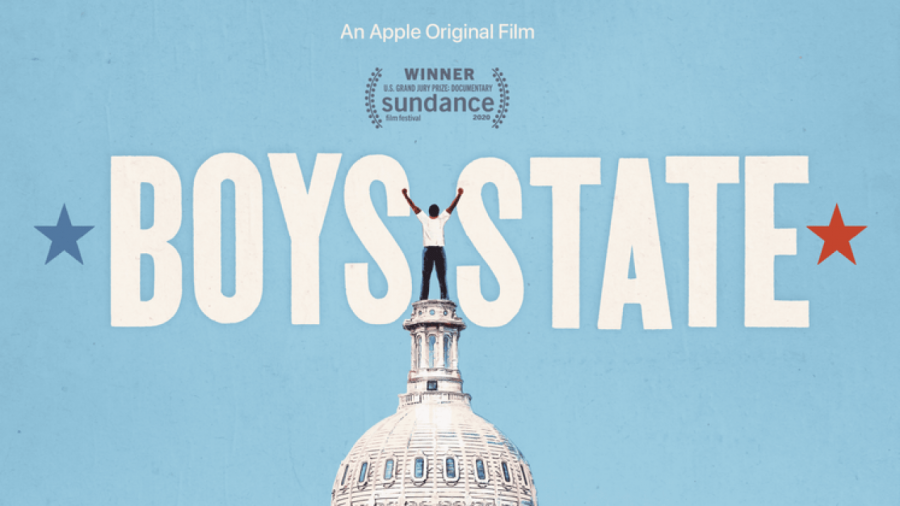‘Boys State’: A look into the making of future politicians
Photo courtesy of Apple TV+
Boys State documentary poster
Boys State is a documentary that follows high school students who attend a week-long simulation of state government. Every state has its own congregation, but this documentary focuses on the 2018 Texas Boys State Event. The boys are separated into two groups, the Nationalists and Federalists, with no party platform assigned. It is up to the boys to vote for a leader of the party. Under the guidance of the leader, they develop a party platform and elect candidates to represent their ideals. The most important part of this educational simulation is the election at the end when the entire group votes for candidates. The highest position of the event is being elected governor.
Viewers follow Boys State in the gathering of signatures on petitions, platform debates, elections within specific parties, primaries, campaigns and Election Day. However, there is another angle of the documentary focused on footage showing events that take place outside of the competition’s boundaries. For example, there is footage in participants’ homes and neighborhoods that helps give the audience a better understanding of why the boys have certain political views.
The documentary focuses on four main participants: Ben, Steven, Robert and Rene. Ben is placed with the Federalist party and is a self-described “political junkie.”He believes that people now fail to recognize America as the greatest democracy in the world and hard work still gets people to where they want to go. His dream was to be in the military, but unfortunately, as a child, he lost both of his legs to meningitis, so he wants to serve the country as a civil servant.
In stark contrast, Steven, a Nationalist, identifies as a progressive who grew up idolizing Bernie Sanders. Steven gained an interest in pursuing politics when watching Sanders because of his charisma and the command Sanders demands. “We shouldn’t be inspired by fear. We should be inspired by hope,” Steven says while describing how his morality leads his political agenda.
Robert is another highly documented participant in Boys State. He is outspoken about the importance of patriotism in America. He takes a strong stance supporting the Second Amendment and is against abortion publically. However, in private, Robert states that he is pro-choice, but hasn’t been vocal about it because the minority opinion will not succeed. This is a very interesting part of the documentary because it shows the extent to which people will lie to gain political support. It shows the manipulative aspect of politics and it’s shocking to watch how easy it was for Robert to lie to hundreds of boys about his beliefs.
The documentary does a great job of balancing the ideas of the four main characters. By focusing on two right-leaning and two left-leaning participants, it presents a bipartisan view. However, this documentary exemplifies the lack of diversity in politics. Rene stated, “I’ve never seen so many white people ever,” when discussing his first impressions of the event.
It is important to diversify events like Boys States because future politicians are born in political simulations like this; some alumni of the event include very prominent political leaders like Bill Clinton and Chuck Grassley. A more diverse event will only bring more perspective to the participants, which leads to a broader understanding of politics.
The documentary shed light on the rise of outlandish ideas, with the conservative majority of boys promoting some concerning legislation that went beyond their established agenda. There was also an aspect of misogyny presented in the documentary that was a little upsetting. During a state party chairman speech, a boy stated “Our masculinity shall not be infringed.” There seemed to be a correlation between physical strength and leadership. For example, Robert, a West Point hopeful, gained admiration from his peers by demonstrating his physicality.
Overall, the documentary does a great job showing aspiring politicians trying to navigate through an intense simulation despite the lack of diversity and undertones of misogyny.

